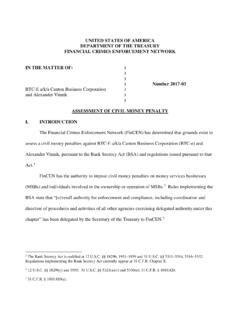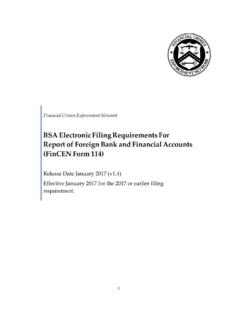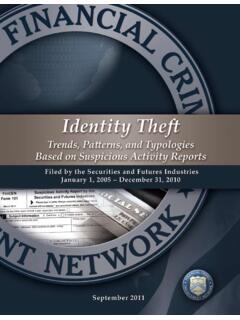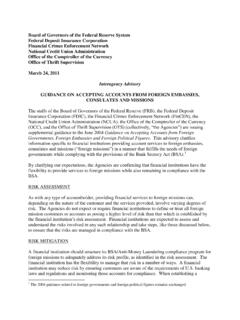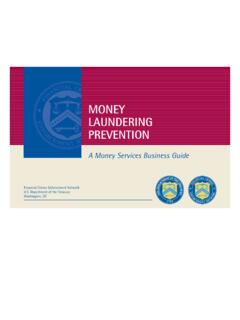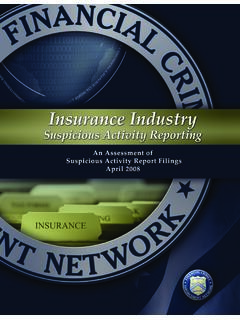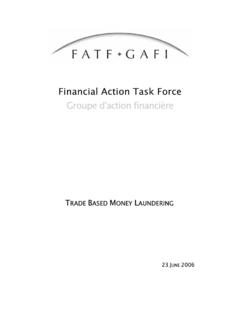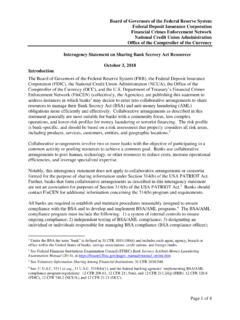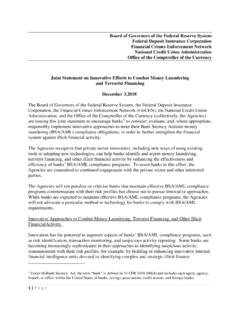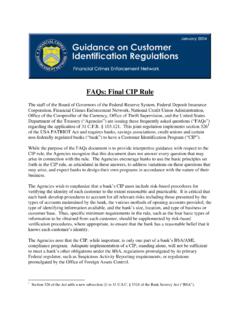Transcription of Advisory on Cybercrime and Cyber-Enabled Crime Exploiting ...
1 1 FIN-2020-A005 July 30, 2020 Advisory on Cybercrime and Cyber-Enabled Crime Exploiting the Coronavirus Disease 2019 (COVID-19) PandemicDetecting, preventing, and reporting illicit transactions and cyber activity will help protect legitimate relief efforts for the COVID-19 pandemic and help protect financial institutions and their customers against malicious cybercriminals and nation-state Advisory should be shared with: Chief Executive Officers Chief Operating Officers Chief Compliance Officers Chief Risk Officers AML/BSA Departments Legal Departments Cyber and Security Departments Customer Service Agents Bank TellersSAR Filing Request:FinCEN requests financial institutions reference this Advisory in SAR field 2 (Filing Institution Note to FinCEN) and the narrative by including the following key term: COVID19-CYBER FIN-2020-A005 and select SAR field 42 (Cyber Event).
2 Additional guidance on filing SARs appears near the end of this Financial Crimes Enforcement Network (FinCEN) is issuing this Advisory to alert financial institutions to potential indicators of Cybercrime and Cyber-Enabled Crime observed during the COVID-19 pandemic. Many illicit actors are engaged in fraudulent schemes that exploit vulnerabilities created by the pandemic. This Advisory contains descriptions of COVID-19-related malicious cyber activity and scams, associated financial red flag indicators, and information on reporting suspicious Advisory is intended to aid financial institutions in detecting , preventing, and reporting potential COVID-19-related criminal activity.
3 This Advisory is based on FinCEN s analysis of COVID-19-related information obtained from Bank Secrecy Act (BSA) data, open source reporting, and law enforcement partners. FinCEN will continue issuing COVID-19-related information to financial institutions to help enhance their efforts to detect, prevent, and report suspected illicit activity on its website at , which also contains information on how to register to receive FinCEN ADVISORY2 Financial Red Flag Indicators of Cybercrime and Cyber-Enabled Crime Exploiting COVID-19 This Advisory addresses the primary means by which cybercriminals and malicious state actors are increasingly Exploiting the COVID-19 pandemic in Cyber-Enabled Crime through malware and phishing schemes, extortion, business email compromise (BEC)
4 Fraud, and exploitation of remote applications, especially against financial and healthcare See Department of Justice (DOJ) Press Release, Department of Justice Announces Disruption of Hundreds of Online COVID-19 Related Scams, (April 22, 2020); the United Kingdom ( ) National Cyber Security Centre (NCSC) Press Release, Public Urged to Flag Coronavirus Related Email Scams as Online Security Campaign Launches, (April 21, 2020); Department of Homeland Security s (DHS) Cybersecurity and Infrastructure Security Agency (CISA) Notification, Defending Against COVID-19 Cyber Scams, (March 6, 2020); Europol Report, Pandemic Profiteering: How Criminals Exploit the COVID-19 Crisis, (March 27, 2020); DHS CISA and Federal Bureau of Investigation (FBI) Public Service Announcement, People s Republic of China (PRC) Targeting of COVID-19 Research Organizations, (May 13, 2020).
5 FBI s Internet Crime Complaint Center (IC3) Public Service Announcement, Increased Use of Mobile Banking Apps Could Lead to Exploitation, (June 10, 2020); and DHS CISA, National Security Agency, NCSC, and Canada Communications Security Establishment Joint Advisory , APT29 Targets COVID-19 Vaccine Development, (July 16, 2020).FinCEN has identified the following red flag indicators of COVID-19 Cyber-Enabled crimes to assist financial institutions in detecting , preventing, and reporting suspicious transactions associated with the COVID-19 pandemic.
6 As no single financial red flag indicator is necessarily indicative of illicit or suspicious activity, financial institutions should consider additional contextual information and the surrounding facts and circumstances, such as a customer s historical financial activity, whether the transactions are in line with prevailing business practices, and whether the customer exhibits multiple indicators, before determining if a transaction is suspicious or otherwise indicative of potential fraudulent COVID-19-related activities.
7 In line with their risk-based approach to compliance with the BSA, financial institutions are also encouraged to perform additional inquiries and investigations where appropriate. Additionally, some of the financial red flag indicators outlined below may apply to multiple COVID-19-related fraudulent activities. Given that many scammers may be directly targeting customers, financial institutions should remain on the alert for potential suspicious activities involving their For the purpose of this Advisory , Cyber-Enabled Crime refers to illegal activities ( , fraud, identity theft, etc.)
8 Carried out or facilitated by electronic systems and devices , such as networks and computers. See FinCEN Advisory , FIN-2016-A005, Advisory to Financial Institutions on Cyber-Events and Cyber-Enabled Crime , (October 25, 2016).Targeting and Exploitation of Remote Platforms and ProcessesThe significant migration toward remote access in the pandemic environment presents opportunities for criminals to exploit financial institutions remote systems and customer-facing processes. Cybercriminals and malicious state actors are targeting vulnerabilities in remote FINCEN ADVISORY3applications and virtual environments to steal sensitive information, compromise financial activity, and disrupt business For information related to publicly disclosed cybersecurity vulnerabilities and exposures, see Department of Commerce, National Institute for Standards and Technology (NIST), National Vulnerability Database; MITRE, Common Vulnerabilities and Exposures: CVE List Home.
9 And FBI IC3 Public Service Announcements, Cyber Actors Take Advantage of COVID-19 Pandemic to Exploit Increased Use of Virtual Environments, (April 1, 2020) and Increased Use of Mobile Banking Apps Could Lead to Exploitation, (June 10, 2020). See also FinCEN Director Kenneth A. Blanco s, prepared remarks delivered at the Consensus Blockchain Conference, Consensus Blockchain Conference (Virtual), (May 13, 2020). Remote identity processes44. For the purposes of this Advisory , remote identity processes include remote processes for customer onboarding and identity verification, as well as authentication of customers for account access purposes.
10 For more information on digital identity standards, see NIST, Digital Identity Guidelines, (December 1, 2017), and the Financial Action Task Force (FATF), Guidance on Digital Identity, (March 6, 2020). also face significant risks, which may include: Digital Manipulation of Identity Documentation: Criminals often seek to undermine online identity verification processes through the use of fraudulent identity documents, which can be created by manipulating digital images of legitimate government-issued identity documents to alter the information and/or photos Criminals Exploiting identity verification processes will typically use either information associated with a real individual s identity ( , identity theft)
